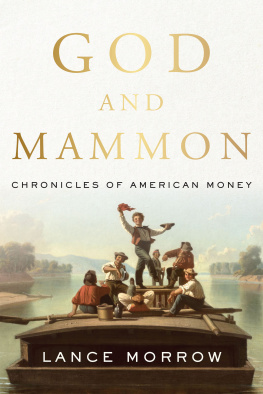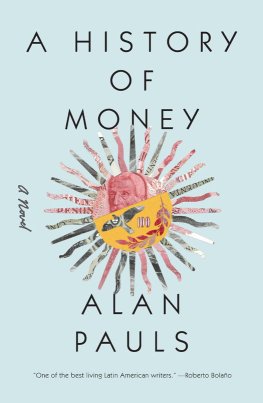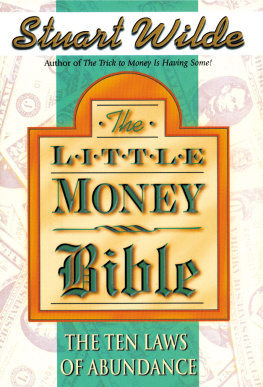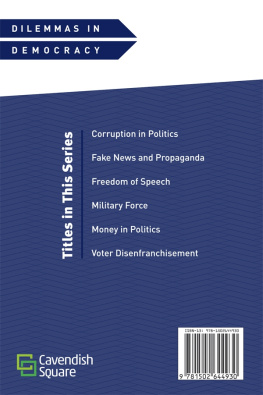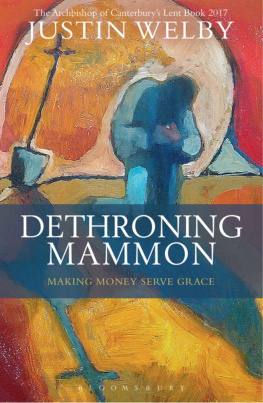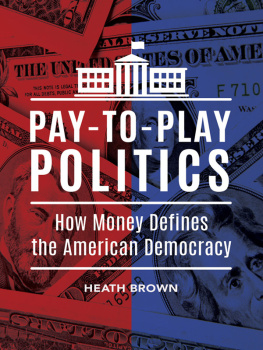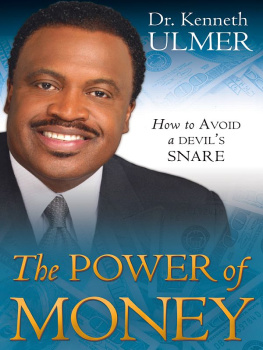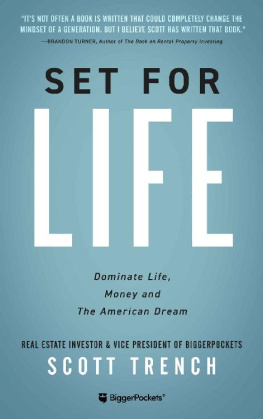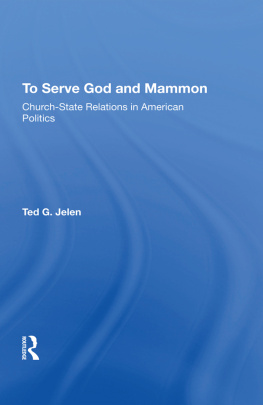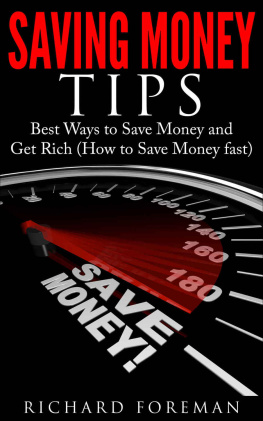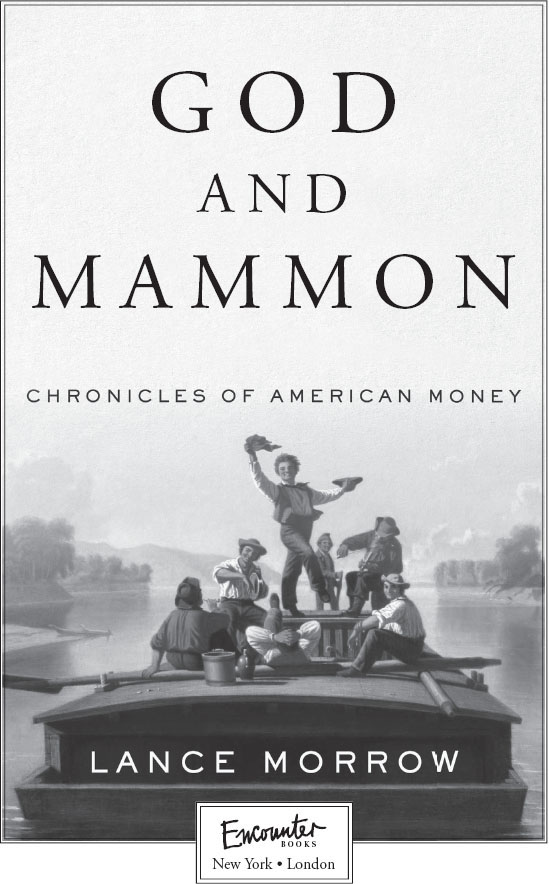
GOD
AND
MAMMON
Also by Lance Morrow
The Chief: A Memoir of Fathers and Sons
Heart: A Memoir
Fishing in the Tiber: Essays
America: A Rediscovery
Safari: Experiencing the Wild (with Neil Leifer)
Evil: An Investigation
The Best Year of Their Lives: Kennedy, Johnson, and Nixon in 1968; Learning the Secrets of Power
Second Drafts of History: And Other Essays
2020 by Lance Morrow
All rights reserved. No part of this publication may be reproduced, stored in a retrieval system, or transmitted, in any form or by any means, electronic, mechanical, photocopying, recording, or otherwise, without the prior written permission of Encounter Books, 900 Broadway, Suite 601, New York, New York, 10003.
First American edition published in 2020 by Encounter Books, an activity of Encounter for Culture and Education, Inc., a nonprofit, tax exempt corporation.
Encounter Books website address: www.encounterbooks.com
Manufactured in the United States and printed on acid-free paper. The paper used in this publication meets the minimum requirements of ANSI/NISO Z39.481992
(R 1997) (Permanence of Paper).
FIRST AMERICAN EDITION
LIBRARY OF CONGRESS CATALOGING-IN-PUBLICATION DATA
Names: Morrow, Lance, author.
Title: God and Mammon : Chronicles of American Money / by Lance Morrow.
Description: First American edition | New York : Encounter Books, 2020.
Identifiers: LCCN 2020021827 (print) | LCCN 2020021828 (ebook) ISBN 9781641770965 (cloth) | ISBN 9781641770972 (epub)
Subjects: LCSH: WealthSocial aspectsUnited States MoneyUnited StatesReligious aspects.
Classification: LCC HC110.W4 M67 2020 (print) | LCC HC110.W4 (ebook) DDC 306.30973dc23
LC record available at https://lccn.loc.gov/2020021827
LC ebook record available at https://lccn.loc.gov/2020021828
Interior page design and typesetting by Bruce Leckie
In memory of my parents
Hugh Morrow and Elise Vickers McCormick
Contents
There swims in the American mind, in depths where sunlight barely penetrates, a fish seldom seen in the twenty-first century.
This is the sense of sin. It is a prehistoric creature; like the coelacanth, all but extincta flickering remnant of the Calvinist.
Once, long ago, the scales of the fish were golden.
Now they are dull and obscure, like sunken Spanish bullion, mossed over by centuries in the deep green sea.
The coelacanth of sin is not alone: it swims in the mind with a twin, a shadow; and that consort is a sweeter, sadder thinga sort of longing.
Thales of Miletus, the pre-Socratic Greek philosopher, astronomer, and mathematician, conceived that the earth is a flat disk floating on an infinite sea, and that the beginning of all things was water.
His student Anaximenes disagreed. He said the beginning of all things was air.
How did America begin? What was its primordial element?
I think it was money.
It was the desire for money. Money, broadly speaking, has been the logic of America: its mystique and raison dtre. It was the hope of moneythe fantasy of it, the greed for itthat drew Europeans across the water. It was the ambition for money that sustained America and made it the richest and most powerful among the nations of the earthalthough not the happiest. It was in the pursuit of money that Europeansand other immigrants who followed onsubdued and overwhelmed the earlier continent and superimposed the America that we see now.
And it was because of moneyexorbitant taxationthat the American colonists rebelled and demanded independence.
Money is an indelicate explanation of America, perhaps, but the truest oneor, anyway, the most intelligent starting point.
Other forces were at work as wellreligious motives touched here and there by fanaticism; Bible stories still resonant, not yet obscure; remnants of Greece and Rome; the Enlightenment; ethnic traditions, darker tribal urges; geography, vast spaces opening westward; climate, which was on the whole seasonal, familiar, and nicely middling; firearms; technology; alcohol; the genius for tinkering.
But money, for better or worse, was the American protagonist, center stagehero or villain. By and by, you had the Malefactors of Great Wealth and Horatio Algers beamish boys. Race and religionthough each of them was very powerful, with deeper resonances than anything so crass and disreputable as moneywere supporting actors. Wealth was the American star.
Money was not, technically, everything. But it was a great deal.
For the sake of simplicityand for the sake of entertainment, too, since money is an entertaining subjectId like to suspend complexity and reduce everything, for a moment, to this one fundamental: money as the American thing.
Alexis de Tocqueville is my witness: One usually finds that love of money is either the chief or a secondary motive at the bottom of everything the Americans do. It agitates their minds but disciplines their lives.
Money became freedoms business partner, the demiurge of the entrepreneurial middle class that founded the country. Money was the American Shinto.
The New World was, in the words of another Frenchman, Hector Saint John de Crvecoeur, une feuille blanche, or a blank pagea fresh beginning of history, a story liberated from the old worlds plot-lines, the worn grooves of centuries. The Puritans came on an errand into the wildernessa religious missionbut soon they set about clearing that wilderness, chopping down trees and selling the timber, and planting wheat, and digging for coal and iron and copper and silver and gold, and putting in railroads and great cities. Money took over as the organizing principlenot religion or birth, class or custom. Money found its apotheosis.
The country was abundant, hospitable, dangerous, and usually heartlessjust as money is inclined to be: ruthless until it develops a conscience and goes in for Improvement. Crvecoeurs New Man had unprecedented mobility. The newcomer might shed the old self and disappear into America and grow a new self. The New World was far enough away to sever the ties with Europes still feudalistic restrictions. Money became the idiom of freedom and its partner, rapacity. Its here that we encounter the paradox of the freedom to enslave. The signature American melodrama of race originated in moneyin the economics of sugar, molasses, rice, tobacco, indigo, cotton, and kidnapped black African labor.
That laborreferring to the African slavesbecame an object, became property and commodity, and even became a medium of exchange. An entry in Encyclopaedia Britannica would report: Scores, perhaps hundreds of different objects have served as money at one time or another, including such things as slaves, gunpowder and the jawbones of pigs. Objects! Such things! The three mediums of exchange seemed to summarize an underthread of American history: slaves, gunpowder, the jawbones of pigs.
The booster spoke of the fruited plain. The bitter realist said, Root, hog, or die. The elegiac intellectual turned away from the spectacle in disgust.
You cant go wrong, in any case, if you think about America in terms of binaries, twinscontradictions that collaborate in the national scheme of things, like positive and negative charges of electricity. America was always to have an aspect of Dr. Jekyll and Mr. Hyde, of God and Mammon, of innocence and sin.
Next page
